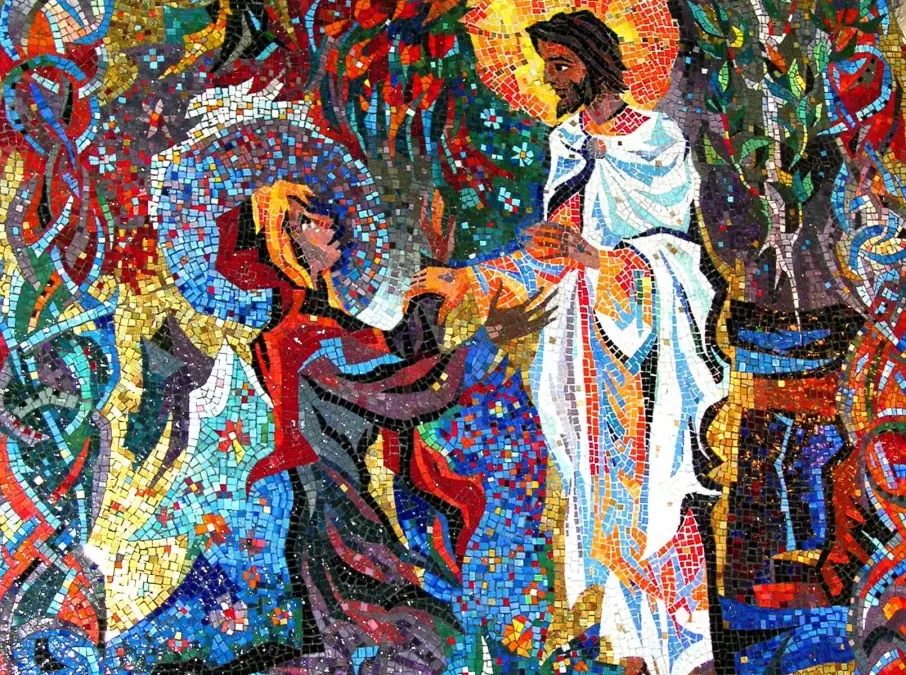Mary Magdalene in the garden with Jesus, detail of mosaic in Resurrection Chapel,
Washington National Cathedral
Early on the first day of the week, while it was still dark, Mary Magdalene came to the
tomb and saw that the stone had been removed from the tomb. 2 So she ran and went to
Simon Peter and the other disciple, the one whom Jesus loved, and said to them, “They
have taken the Lord out of the tomb, and we do not know where they have laid
him.” 3 Then Peter and the other disciple set out and went toward the tomb. 4 The two
were running together, but the other disciple outran Peter and reached the tomb
first. 5 He bent down to look in and saw the linen wrappings lying there, but he did not go
in. 6 Then Simon Peter came, following him, and went into the tomb. He saw the linen
wrappings lying there, 7 and the cloth that had been on Jesus’ head, not lying with the
linen wrappings but rolled up in a place by itself. 8 Then the other disciple, who reached
the tomb first, also went in, and he saw and believed; 9 for as yet they did not understand
the scripture, that he must rise from the dead. 10 Then the disciples returned to their
homes.
11 But Mary stood weeping outside the tomb. As she wept, she bent over to look into the
tomb; 12 and she saw two angels in white, sitting where the body of Jesus had been
lying, one at the head and the other at the feet. 13 They said to her, “Woman, why are you
weeping?” She said to them, “They have taken away my Lord, and I do not know where
they have laid him.” 14 When she had said this, she turned around and saw Jesus
standing there, but she did not know that it was Jesus. 15 Jesus said to her, “Woman,
why are you weeping? Whom are you looking for?” Supposing him to be the gardener,
she said to him, “Sir, if you have carried him away, tell me where you have laid him, and
I will take him away.” 16 Jesus said to her, “Mary!” She turned and said to him in Hebrew,
“Rabbouni!” (which means Teacher). 17 Jesus said to her, “Do not hold on to me, because
I have not yet ascended to the Father. But go to my brothers and say to them, ‘I am
ascending to my Father and your Father, to my God and your God.’” 18 Mary Magdalene
went and announced to the disciples, “I have seen the Lord”; and she told them that he
had said these things to her.
John 20:1-18
“….He makes us utterly real.”
St. Simeon the New Theologian
“As Mary Magdalene discovers amidst her grief and bewilderment in the garden,
recognition of “the Word become flesh” involves remaining open to the possibility that,
through the grace of God, the flesh is equally capable of becoming Word, of reaching
into our hearts and allowing our eyes to perceive with new understanding what had
actually been there all along. When Word issues forth from flesh, Spirit from substance,
all things are brought clearly into focus….As the shades of night begin to dissolve into
morning, Mary, like so many who encountered Jesus before her, experiences a gradual
awakening that blossoms into epiphany only when the Word is added to flesh, when
Jesus calls her forth into new understanding and insight. It is only then that she can see
clearly that the gardener and her rabbi are one and the same.”
Daniel G. Deffenbaugh, Seeds of Shalom
“You may not cling to this delight of his presence, for you are not only in the garden but
still in the desert as well, and he is the manna that you must seek each day, your daily
bread. You have no need to cling to this experience. Rather, you must find him where he
dwells in his brothers and sisters. Go and tell the others the good news: through the
waters they are reborn into this garden of the beginning, where his Father is their father,
and they are his brother and sister and mother. Let them look deeply enough into the
waters of their grief and they will experience this for themselves: they will find the
garden there and he, risen, in its midst.”
Bruno Barnhart, The Good Wine: Reading John from the Center
There is a sober dimension to the Easter feast no matter how it is viewed. The feast
gives immense comfort to millions because it announces that death is not the end. For
them – and I trust for us – it is a season of hope. Sin and death are realities in our lives.
We recognize in Jesus their conqueror.
Yet the victory appears tenuous because the presence of evil and the fact of death are
so pervasive. Are we playing out a charade in celebrating the mysteries of Christianity?
Are we not just whistling in the dark?
The possibilities of God, however, are vast. Signs of hope abound. They are found
among those working for climate justice and a sustainable future. They can be seen
among those who struggle against racism and every other form of exclusion and
oppression. They are emerging in the lives of those who are seeking through prayer and
silence a deep and contemplative attitude to life. God who is creator and redeemer of all
has saved the world through a young man in his thirties. Jesus’ reliance on God was
greater than the force of sin or death or evil in high places. We thus have every reason
to hope and act.
Kevin+


Recent Comments